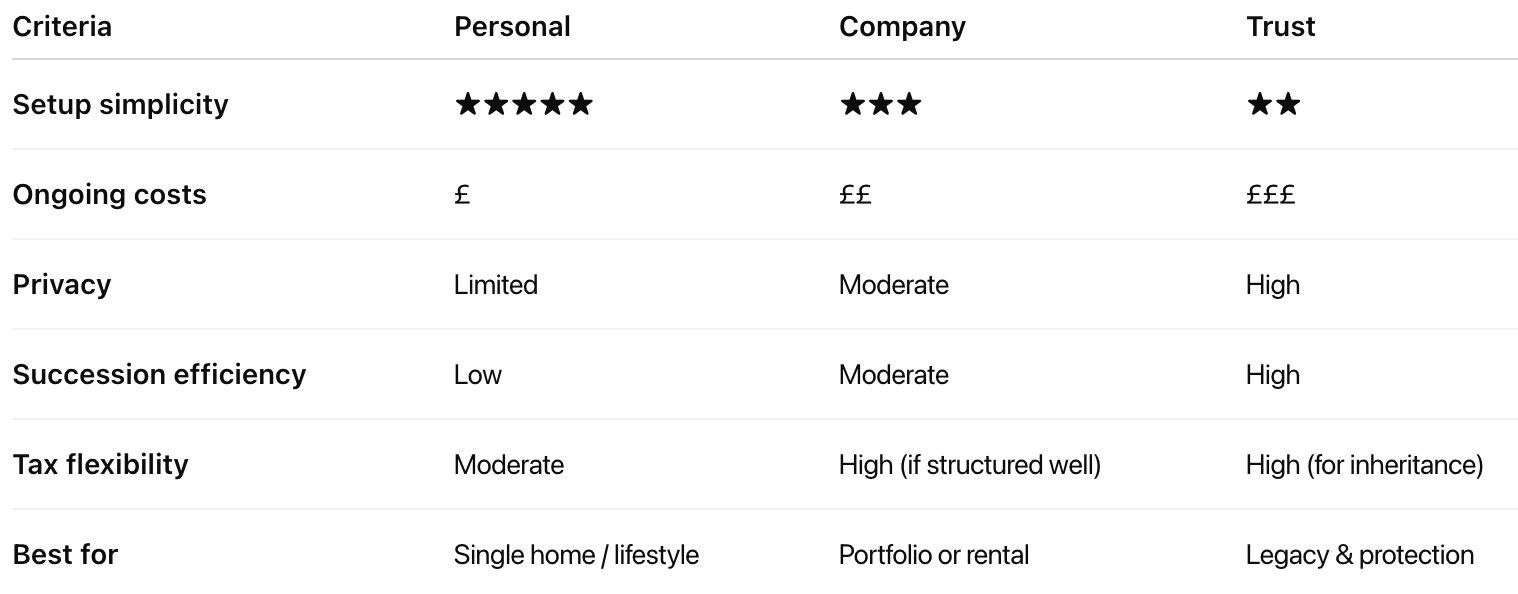Structuring Overseas Property Ownership: Personal, Company or Trust?

Why Ownership Structure Matters
For many UK investors, buying abroad feels like a lifestyle choice — but the legal structure you choose defines how that asset behaves for decades.
The difference between holding property personally, through a company, or within a trust can affect:
- Tax efficiency (both UK and foreign)
- Succession and inheritance planning
- Privacy and control
- Access to finance
- Exposure to double-tax agreements
At Lucid Financial Markets, we help clients model these factors early — before contracts are signed — so ownership complements their wider wealth strategy.
Option 1: Personal Ownership
✅ Advantages
- Simple to set up — purchase in your own name.
- Qualifies for certain reliefs (e.g. personal capital-gains exemptions in some EU countries).
- Straightforward financing and insurance.
⚠️ Drawbacks
- Full personal exposure to foreign tax and reporting.
- Potential double taxation on rental income or capital gains.
- Inheritance may trigger probate or cross-border legal delays.
Best for: Lifestyle buyers or single properties with limited rental activity.
Option 2: Company Ownership
✅ Advantages
- Corporate veil separates personal and property liabilities.
- May simplify joint ownership between family members.
- Easier to transfer shares than the property itself — efficient for succession.
- Potentially favourable treatment for business-use properties or portfolios.
⚠️ Drawbacks
- Ongoing compliance costs and foreign corporate tax filings.
- Some countries impose higher property taxes on corporate entities.
- Gains may face both local corporation tax and UK tax on dividends.
Best for: Investors with multiple overseas assets or those seeking long-term income generation.
Option 3: Trust Ownership
✅ Advantages
- Provides privacy and continuity — property held by trustees on behalf of beneficiaries.
- Useful for succession and estate planning across generations.
- Can integrate with broader wealth or family-office structures.
⚠️ Drawbacks
- Complex legal setup; requires professional administration.
- Some jurisdictions impose additional registration or disclosure requirements.
- Potential double taxation if not properly coordinated between UK and local law.
Best for: Families prioritising legacy and asset protection over short-term efficiency.
Cross-Border Coordination — The Lucid Framework
Effective structuring isn’t just a legal choice;

Lucid coordinates these moving parts so ownership, financing, and currency strategy operate seamlessly.
Comparative Overview

Lucid Insight
Ownership structure should never be an afterthought.
By assessing your tax position, intended use, and long-term objectives, Lucid helps you determine the optimal framework — not just for the property, but for your wealth ecosystem.
Key Takeaways
- Structure drives both tax outcomes and family continuity.
- Personal ownership is simplest; trusts and companies bring flexibility but complexity.
- Always integrate legal, tax, and FX planning — they operate together.
- Review structure annually as tax treaties evolve.
If you’re considering a property purchase abroad, speak with a Lucid Advisor before finalising your ownership structure.
We’ll coordinate with your legal and tax partners to ensure your property fits neatly within your long-term financial strategy.
We help...



.svg)
Our take

That is the beauty of working with us – you'll be able to consider yourself a foreign exchange expert once you've worked with us.
Currency exchange involves buying and selling one currency for another at a specific rate – the same way that you buy anything else. Of course, the rates fluctuate based on interest rates, inflation, world events, and even market sentiment.
If you don't already work in the industry, it can be confusing. That's why our number one aim is to demystify it for you, so you are never wondering about when or how to move your money – which means you can proceed with your transaction without feeling stressed or rushed at any point.
Working with us is vastly different from working with a bank. We don't have chatbots, call centre options, or email automation systems.
We don't have financial targets, as we measure ourselves purely on client satisfaction and our 5* Trustpilot reviews. And all that while getting your money transferred faster and at a better rate.
We take security extremely seriously. If we haven't hammered home the point enough, transferring your money securely and safely is our number one priority - not marginal rate differentiators.
All client funds are held separately to our company funds and placed in safeguarded accounts held with UK and EU banks. In the extremely unlikely event that we or one of our counterparties were to become insolvent, the funds held would form an asset pool where clients would be paid above our creditors.
The bank(s) or authorised credit institutions have no rights over funds in safeguarded accounts. Counterparties have no rights over our clients’ accounts, other than where specified in the Terms and Conditions.
We offer the works: spots, forwards, market orders, limit orders, and stop-loss orders.
But what's important to us isn't the technicalities of what we offer - it's that you come away feeling informed, confident and happy.
We prioritise the security and confidentiality of client funds and transactions via our trusted panel of counterparties who are categorised as Electronic Money Institutions (EMI).
All funds held on a client's behalf are subject to safeguarding - they are always protected and can be issued back should any of our counterparties go into administration or liquidation.
Unlike holding money in a standard bank account, all clients’ funds are protected, regardless of the value.




